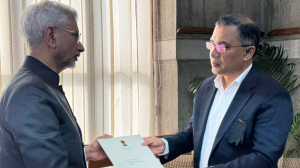Root Cause
Sourabh Phadkes case is similar to a popular advertisement,where a doctor advices his patients-walk when you talk and ends up having lost all his patients.
Unlike his batchmates,who followed the trend of designing malls and multiplexes,Sourabh Phadke is successfully experimenting with local natural resources and recycled materials to help villagers construct their own homes
Sourabh Phadkes case is similar to a popular advertisement,where a doctor advices his patients- walk when you talk and ends up having lost all his patients. However,the only difference is that this city-based architect is happy being replaced. Be it the eco-friendly homes constructed using recycled materials and sand or the sewage systems designed using soft drink bottles,he has a clear-cut philosophy to support his stand architects and engineers are important,but their absence in rural areas does not mean no development of those areas.
In my first year of architecture,I felt like giving it up simply because of the disconnect between what the society needs and the kind of professionals curriculum produces. If majority of our population is living in rural areas and do not even have basic shelter taken care of,why are architects today designing swanky malls and multiplexes in the city, asks Phadke,who after finishing his graduation,opted to walk the path less trodden.
Currently an ecology teacher in Aman Setu,a school he has co-founded,and done the architecture for,Phadkes weekly activities include teaching,visiting rural areas and helping local villagers with eco-friendly infrastructure designed to meet their needs using material easily available around them,propagating education to village children with the help of surroundings and so on. In one of the villages called Kuran near Panshet,we have constructed an ecological sanitation system to suit the needs of local villagers in such a manner that the same sewage waste can be recycled for agricultural purposes after re-circulation. There are over 30- 40 demo-toilets being constructed on similar lines, says Phadke.
From the walls in his school that are constructed using sand bags to Urine Diversion Dehydration Toilet,or for that matter,the science lab of the school that is located in a discarded PMT bus,Phadkes philosophy behind the work is- Knowledge and techniques should be dissimilated. Just because there is no engineer or architect at a particular place,development there should not come to a standstill. So rather than constructing houses in the villages,I train local villagers about how they can construct their own houses using material easily available around and that how can they separate the biological wastes from toilets and utilise it for farming as fertilisers. Similar is it with children in schools. Children in my school go back to their homes and tell their parents the uses of sand or that the toilets they have at home are incorrect from the point of view recycling, smiles Phadke.
With a survey on snakes in Tamhini,Mulshi and Pune as his weekend activity,in the pipeline is a one-month visit to Andhra Pradesh,Karnataka and Tamil Nadu where Phadke will be visiting local villages and consulting them on the organic construction accessible at local level.
The whole idea is to change ideologies. We have a natural tendency to complicate things. There was a time when man constructed shelter,using material from the nature. Today,we have not only forgotten the techniques but having cement concrete houses is linked to success and satisfaction and status related aspects of the society. For example every human being on a yearly basis generated 50 kilos of faecal waste and 500 litres of urine. All this goes to the rivers and then to the sea only to be wasted,while we complain of shortage of fertilizers. Now,isnt the process supposed to be circular and not straight by which we can process the waste and use it as fertilizers for our farms, smiles he.







